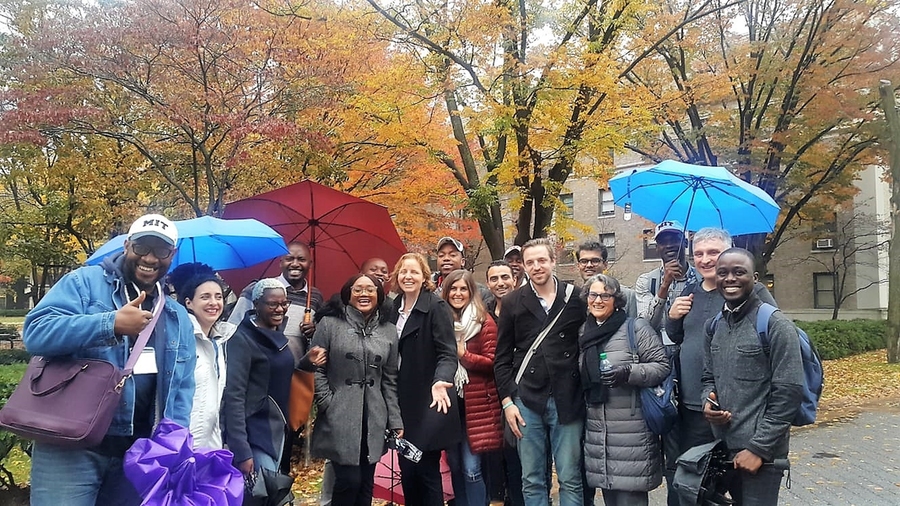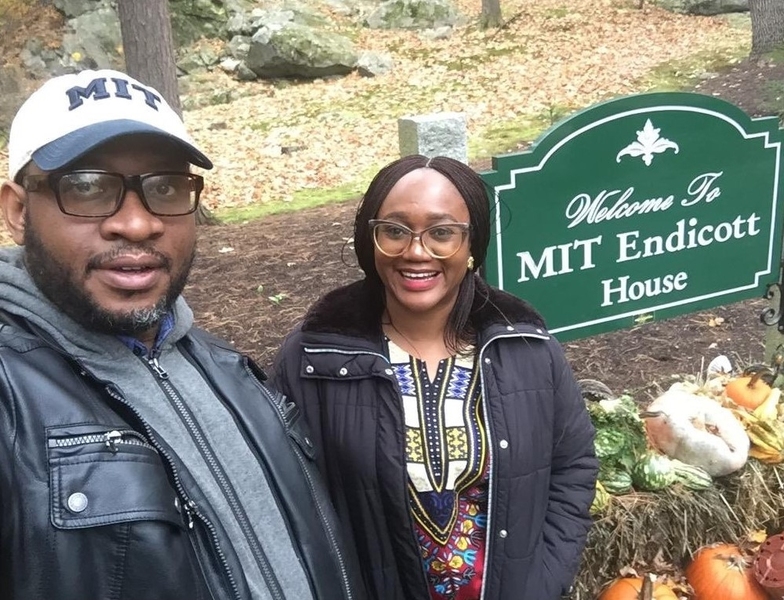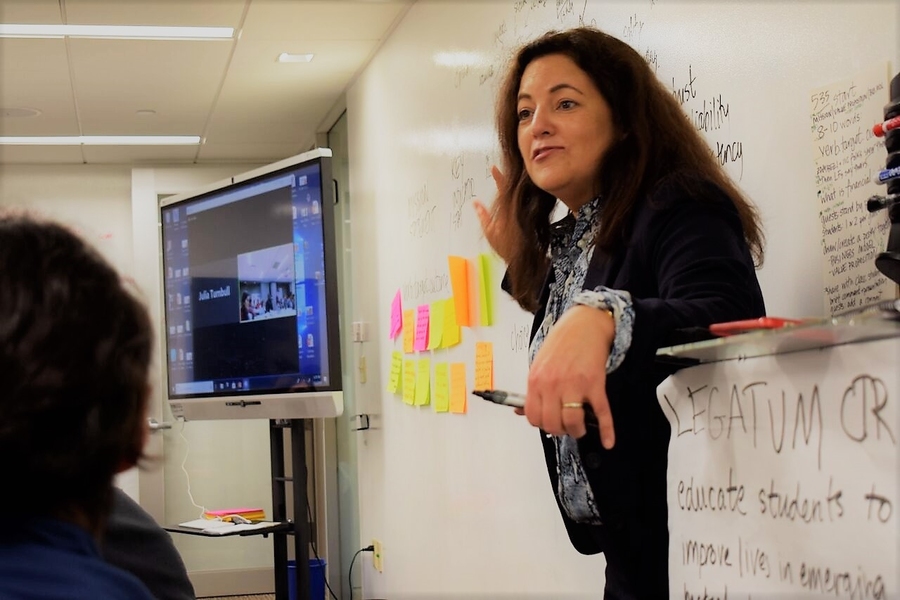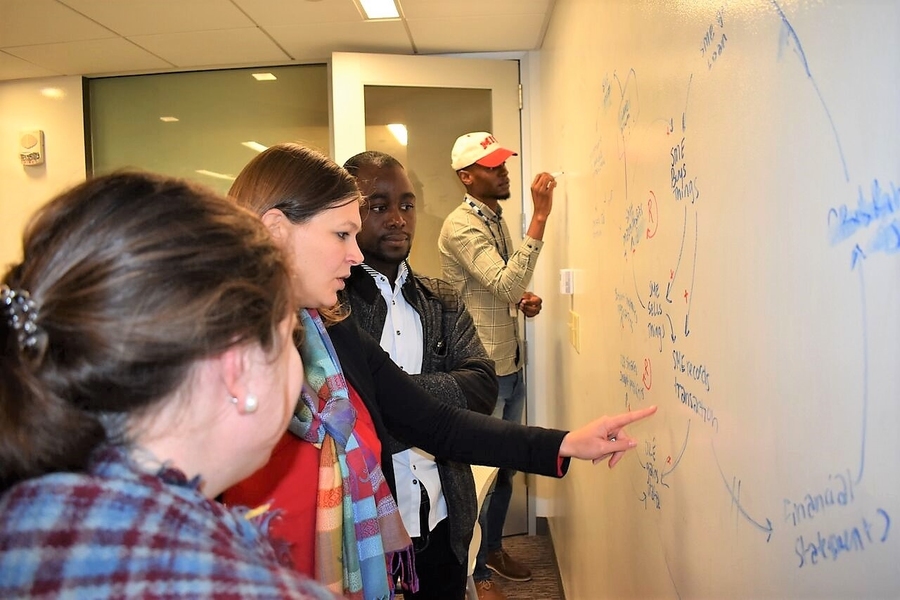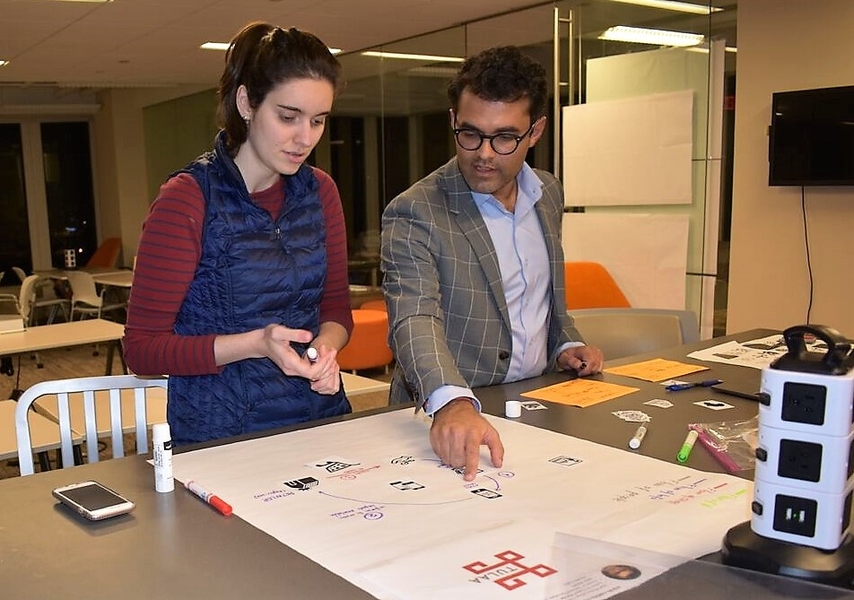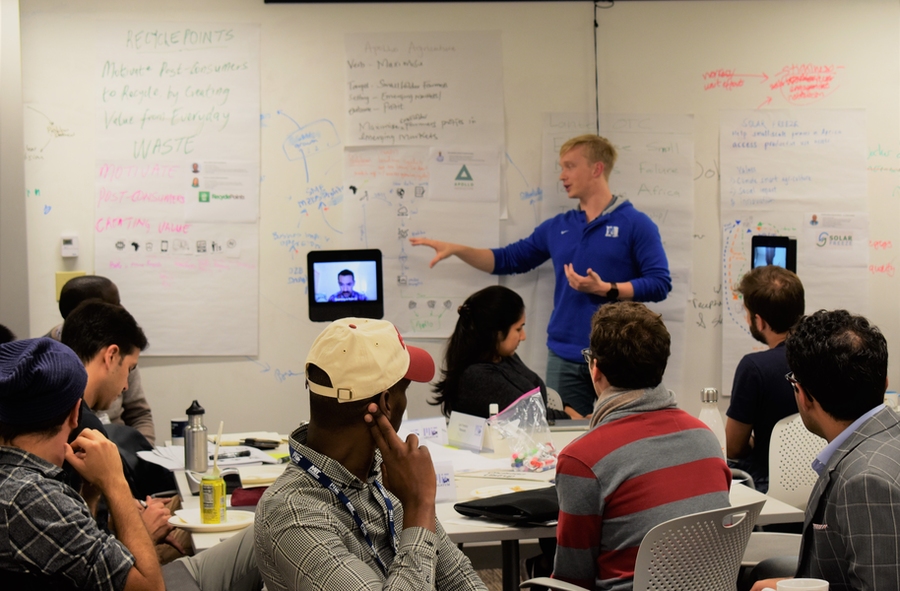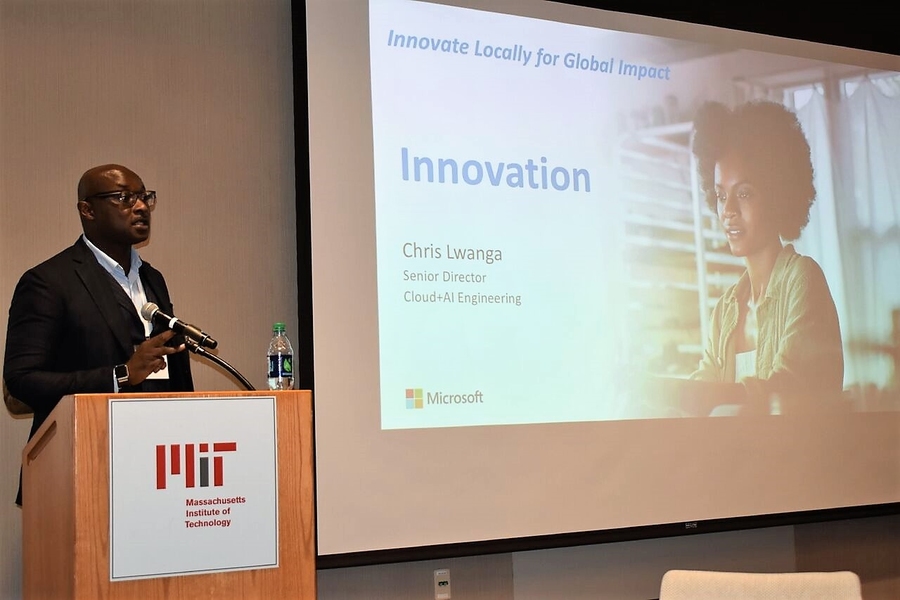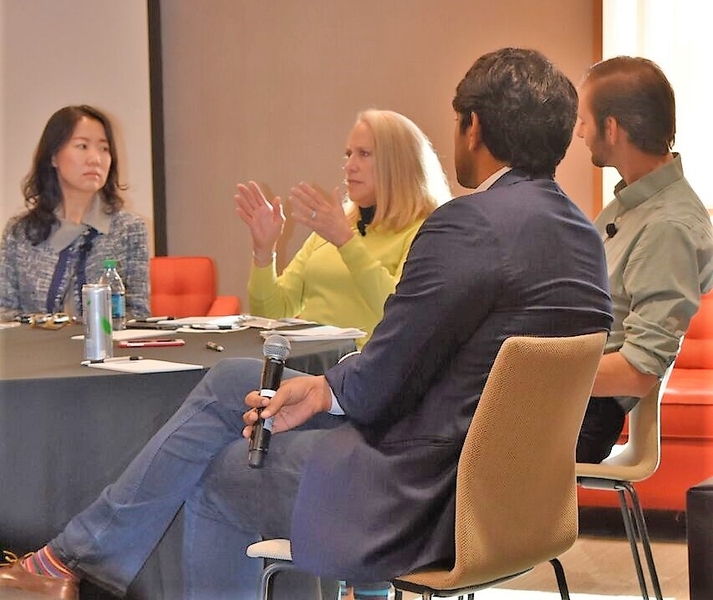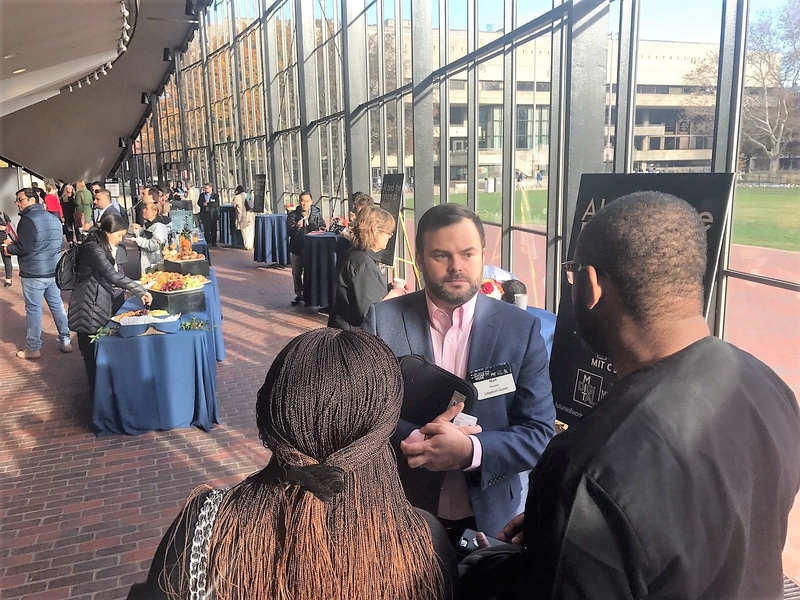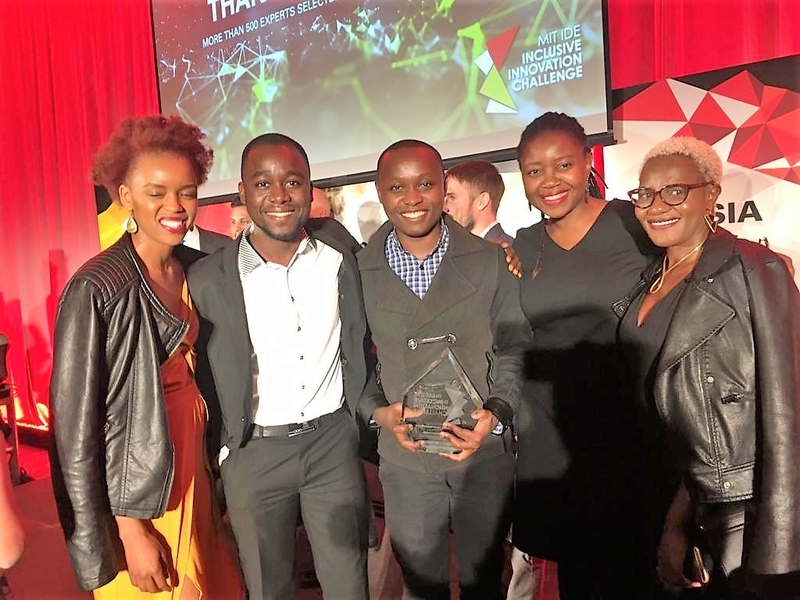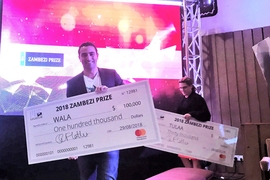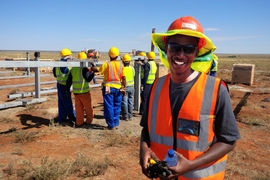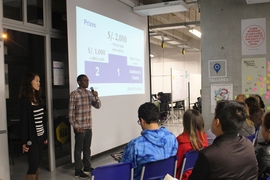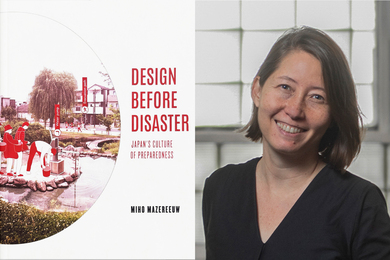In November, 17 leading entrepreneurs from Africa visited Cambridge for the MIT Legatum Leadership Forum – Zambezi Week 2018, a four-day boot camp designed to bolster skills and amplify impact. The forum, organized with support from the Mastercard Foundation, also provided Institute experts and students with unique insights into Africa’s fast-evolving entrepreneurial ecosystems from the perspective of leaders on the ground.
MIT has cultivated some of the world’s most prodigious entrepreneurs, a number of which are driven by their desire for impact and a more inclusive prosperity. For them, emerging markets like Africa can be the perfect ecosystem in which to launch an innovative venture that generates both profit and socioeconomic change.
This year’s forum participants, all African entrepreneurs, were selected for their achievements in inclusive innovation. The top 10 finalists for the Zambezi Prize for Innovation in Financial Inclusion were invited to attend, as were the four regional winners for Africa in the MIT Inclusive Innovation Challenge (IIC). They joined MIT faculty, students, and alumni for interactive skills development, networking, cohort-building, panel discussions, and various opportunities to explore entrepreneurial resources and culture at MIT.
“The week was a power MBA, essentially, designed for African innovation-driven startups,” said Emmanuel Luthuli, cofounder of LanteOTC, an investment crowdfunding platform for small-medium businesses. “We discovered that many of the challenges we face are not unique to South Africa, as we first thought. There’s value in stepping out of your environment to meet with other small businesses going through the same issues, and to getting exposed to the standards and thinking of a world class facility like MIT.”
“We’re honored to gather so many of Africa’s rising stars here,” said Fiona Murray, associate dean for innovation at the MIT Sloan School of Management. “We’re going to learn a lot from these entrepreneurs about the opportunities and challenges in Africa. The innovativeness they exhibit in solving complex challenges like financial inclusion, technology access, and job creation is not just inspiring, it’s profoundly educational.”
Participants also spoke with investors, media experts, and corporate stakeholders. These included: Deborah Drake, vice president of the Center for Financial Inclusion at Accion; Jake Bright, contributor to TechCrunch and author of "The Next Africa" (MacMillan, 2015); Chris Lwanga, senior director of software partnerships at Microsoft; and Mark Wensley, associate director for next generation technology and market linkage at Mastercard Foundation.
Ventures invited to send founders and leaders to the forum were Recycle Points (Nigeria), Apollo Agriculture (Kenya), Bidhaa Sasa (Kenya), FarmDrive (Kenya), Farmerline (Ghana), LanteOTC (South Africa), MaTontine (Senegal), OZÉ (Ghana), Tulaa (Kenya), Wala (South Africa), WeFarm (Kenya), Solar Freeze (Kenya), and Lynk (Kenya).
The forum was hosted by the MIT Legatum Center for Development and Entrepreneurship, a hub dedicated to attracting and cultivating principled, innovative entrepreneurs launching ventures in the developing world. The center’s portfolio includes not only events, seed grants, and fellowships for MIT students but also global programs like the forum and the Zambezi Prize that engage and expand the center’s network beyond students and alumni.
Both the forum and the Zambezi Prize also serve to advance the MIT-Africa initiative, an Institute-wide commitment to coordinate and expand MIT connections with the continent.
Georgina Campbell Flatter, executive director for the Legatum Center, said connecting the forum to the Zambezi Prize leverages a unique educational opportunity. “We created a prize that doesn’t just culminate in a one-time celebration of entrepreneurship, but serves as the launchpad for a longer educational journey. Once the prize has gathered together a diverse group of extraordinary entrepreneurs, we can deliver education that will amplify their impact, and fold them into our knowledge-building community.”
As for the center’s educational goals during the four-day forum, Flatter said, “Whether we’re working with MIT students or global prize winners, whether it’s a one-year fellowship or a four-day boot camp, our goal is always the same: equip entrepreneurial leaders with a mindset, skillset, and community that maximizes their capacity for impact.”
In the near term, this meant giving forum participants the tools to help them succeed in their current venture. But the Legatum Center believes in cultivating entrepreneurs, Flatter said, not just their ventures, because the impact an entrepreneur makes is best measured over the course of his or her lifetime. “Whether they continue to scale their current venture, move on to launch new ventures, or transition into other stakeholder roles such as investors, policymakers, NGO executives, or academics, they will understand the power of principled entrepreneurial leadership to affect great change, and use their talent and influence to shape ecosystems accordingly.”
The forum began with a one-day workshop, wherein participants mapped out the vision and principles behind their ventures, then explored how their approach to elements like team selection, growth strategy, and board management could help them reach their goals. Anjali Sastry, senior lecturer at MIT Sloan and faculty advisor for the Legatum Center, said she was surprised to learn that most of the participants had not yet established boards of directors, but instead were getting by as long as possible with informal advisory groups. “Steps in building a business — such as assembling a board — can take longer in the emerging economies of Africa where startups work harder and longer to raise investment funding. We were able to discuss many practical ideas for how emerging startups can build the right board that will serve them today and set the stage for their future growth.”
The second and third days emphasized opportunities to explore the resources and culture at MIT. This included tours of the MIT Sloan campus and the MIT Media Lab as well as attending classes on topics related to emerging market businesses. In the Impact Ventures class, forum participants joined Legatum Fellows for a discussion around financial inclusion and a case-by-case examination of each of their businesses. “Everybody learned from the interaction. Fellows, many of whom are in the earliest stages of designing a venture, learned about the operational, financial, and strategic challenges of building a business that can grow,” Sastry said. “Forum participants benefited from teams of MIT students examining their business models.”
For Chioma Ukonu and Mazi Ukonu, cofounders of RecyclePoints, the forum’s highlight was being invited by Joost Bonsen to present in his Development Ventures class about their venture, which incentivizes recycling in Nigeria by rewarding collectors with points redeemable for household items and cash. “We got feedback that could really change how we engage with a special segment of subscribers in our recycling model,” Mazi Ukonu said.
When it came to Africa’s entrepreneurial ecosystem, participants often reaffirmed impressions that presenters and organizers had coming in. Occasionally, however, they offered highly contrasting perspectives, said Ali Diallo, the Legatum Center’s global programs manager. “In one presentation, for instance, we were touting the success of the microloan model in Africa, and one of the forum participants interjected with a very sound argument for why microloans sometimes do more harm than good in the community.” Diallo said this was jarring at first, but a good sign overall. “We always tell our entrepreneurs to challenge their assumptions, and we aim to challenge ours as well.”
Discussions around investing also proved valuable for both sides, Diallo said. A common predicament for emerging market ventures, even those with high potential, is finding the right investor fit. Traditional investors, for instance, often have short-term financial goals that don’t match well with a venture’s impact-oriented goals, but even the newer breed of social impact investors can be challenging, since they often have short-term impact goals that don’t align with a venture’s long-term financial strategy (e.g. if the venture must focus in the short term on higher-income customers before scaling to serve the poorer customers who will benefit most). Such ventures, though they exhibit both financial and impact potential, are caught between a rock and a hard place raising capital. “If we’re going to empower these change-makers, we need a new venture capital model,” Diallo said. “These are the kinds of issues we need to raise to stakeholders at the highest levels. What we learn from forum participants now will inform those discussions.”
Forum participants spent their final day at the AI and the Future of Work Congress. Later that evening, at the IIC Global Gala, two ventures headed by Forum invitees, WeFarm and Solar Freeze, won grand prizes of $250,000 each.
As the forum wound down, Flatter said, many discussions centered around strategies for staying connected with the Legatum Center, with MIT, and with each other. “For sure, we’ll be seeking them out for mentoring and speaking engagements, both here and in Africa. We’re also preparing case studies on several of them,” she said. “Something that really energized participants was the prospect of hosting MIT students as interns, so we’ll be strategizing about that too.”
Flatter emphasized that the conclusion of the forum would not mark the end of the Legatum Center’s engagement with these entrepreneurial leaders, nor would that engagement be limited to their current startup. “More than any single venture they create, the cumulative impact they have over their lifetime will become their legacy.” (“Legatum” is Latin for “legacy.”) “We are here to help them build that legacy. That’s what inspires us.”
